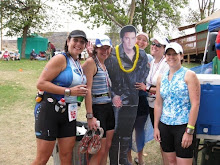From Joanna Zieger's blog - Fast at Fourty (which is an awesome blog!)
This article was written with Dr. Phil Skiba, my coach and an extremely nice guy (http://www.physfarm.com/)
“I don’t want to lose my fitness” is perhaps the most commonly uttered statement by triathletes. I have no actual data to support this, but given the number of times I have heard it (and expressed it myself) I am reasonably confident that it must be true.
I think triathletes have a dreaded fear that between the time they close their eyes at night and awake in the morning they have lost inordinate amounts of fitness. A day off is a triathlete’s nightmare – we feel the fitness being sucked out of our bodies moment by moment.
The meaning of fitness varies from person to person. Are you fit because you can ride a century? Are you fit when you race to your potential? Are you fit because you can achieve most of your workouts?
No matter what your definition of fitness is, it does not disappear as quickly as the sunburn from your last race. Breaks in training occur for a number of reasons, whether it is from injury, work, travel or simply some needed time off. And, unless you have taken an excessive amount of time away from training, you are not going to come back as a deconditioned couch potato.
Here are the facts. Most people confuse the terms "fitness" and "performance status". In other words, when we perform well, we typically say we have a very high level of fitness. That is true, to a point. However, it is just a little bit more complicated than that.
When we train, our bodies become more fit, but we also get more tired. In the midst of a heavy training block, think about the yearning for that late afternoon nap or begging off dinner with friends because coming home at 10 pm is too late.
When we train or race a lot, our fitness becomes somewhat "masked" by how beat up we feel. The perfect example is the post Ironman fatigue and soreness syndrome. You couldn’t and shouldn’t train in the days following an Ironman. This time off doesn’t mean you are losing huge amounts of hard-earned fitness. it's just that your fitness is being hidden by tiredness, which would lead to a decrease in performance status if you tried to race again too soon. (It’s also being hidden by the not-insignificant damage Iron-distance racing does to the body. It would not be unreasonable to consider yourself “mildly injured” and in need of recovery immediately following a long-course race.)
To perform well, consistently, you need regular bouts of rest. If you are going out and killing bike ride after bike ride, and run after run, you don't really know how well you can perform, because you are constantly fatigued. This is why athletes sometimes have a great race after a layoff due to that minor injury, work craziness, or interference from other life factors. The layoff allowed the athlete to shed a great deal of fatigue. This is why tapering for a race works. You shed your fatigue, preserve most of your fitness, and are then able to smash a race.
Now, if you were to do some fancy math, you would find that you did lose a small amount of fitness during a training layoff. However, if you are training a lot, this loss is tiny in comparison to how much fatigue you lose. Depending on the sport, the average age group triathlete can shed two thirds of their fatigue in between 2 and 7 days. In comparison, it can take longer than 30 days to lose two thirds of their fitness. Get the idea? Your fitness hangs around a long time.
In my own training, I can attest to this very notion of fitness hanging around. I took a break after the Rev3 debacle for some quality healing time. I started a comprehensive therapy program in the gym and when I restarted training, it was maintenance and sanity training rather than specific race training. Lo and behold, over the weekend I PR’ed a tough run.
It's a different matter if you have suffered through some major illness, of course. 7 days of absolute bed rest with the flu or something is going to have a much more significant effect in terms of loss of fitness and performance status
The take home message is "don't sweat the small stuff". Those couple of days you need to take off when the in-laws arrive probably just serve to help you really crush your next workout!
Subscribe to:
Post Comments (Atom)





















No comments:
Post a Comment